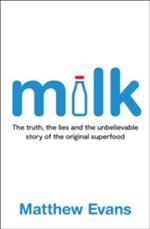Milk. It’s in our coffee, on our cereal. We see it in processed form – yoghurt, butter, cheese, skimmed and lactose free. It’s there in almond form, or made from oats or soy, and is as lauded as the ‘perfect’ food or lambasted as not fit for human consumption and a toxic planet killer, depending on who you trust. Which type you drink, whether you were raised on breastmilk, what you think of it, is affected by culture, biology and fashion. How you view it is driven by your gender and your politics, as well as your geography. The miracle liquid has suffered an image problem. It has been used to keep people poor, to keep women subjugated, and to build corporate and medical careers. It’s been blamed for climate change, the breakdown of human health, and an enabler of the industrial revolution. From perfect food to pariah, milk’s role in life has often been debased. Milk celebrates the majesty of this noble liquid, and delves into the many pretenders to its throne, from formula to mylk. It looks at the transformation of what a milk-producer eats into one of the most nutrient dense foods available, and how that can be transformed again into the butter, cheese and clotted cream that we know and love today. It’s an exploration of the science, history and politics of what makes mammals different from every other life form on earth.

Milk : the truth, the lies and the unbelievable story of the original superfood
ISBN: 9781922616869
Format: Paperback
Publisher: Murdoch Books (UBD)
Origin: GB
Release Date: July, 2024


